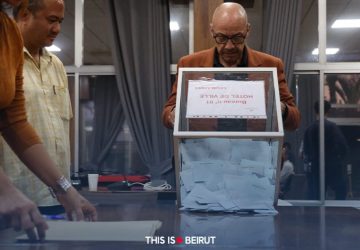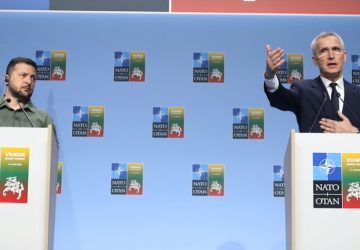Russian President Vladimir Putin faced the most serious challenge to his long rule on Saturday when the leader of the Wagner mercenary group vowed to topple Moscow’s military leadership.
Yevgeny Prigozhin, 62, released a series of messages from late Friday into Saturday claiming that he and his troops had entered the southern Russian city of Rostov-on-Don and taken control of its military sites.
That sparked a series of extraordinarily fast-moving events, with the private army initially threatening to march on Moscow before Prigozhin suddenly announced a pullback.
On Russian social networks, videos showing Wagner’s columns en route to Moscow.
Here is what we know so far:
What sparked the rebellion?
For months, Prigozhin has been locked in a power struggle with the military top brass, blaming them for his troops’ deaths in eastern Ukraine.
He has repeatedly accused them of failing to equip his private army adequately, of holding up progress with bureaucracy, while claiming victories won by Wagner as their own.

On Friday, Prigozhin’s anger appeared to boil over, as he accused Moscow’s military leadership of ordering strikes on Wagner’s camps and killing a large number of forces.
He said they had to be stopped and vowed to “go to the end”.
He later claimed his forces had downed a Russian military helicopter.
Hours later, the leader of the mercenary group said he had military sites in southern Russia’s Rostov-on-Don “under control”.
The private military force reportedly then advanced on, with the governor of the Lipetsk region, whose capital is about 420 kilometres (260 miles) south of Moscow, saying the troops were “moving across” the territory.
But just as suddenly, Prigozhin announced that his troops were turning back to avoid spilling blood.
His fighters also began withdrawing from Rostov-on-Don.

How Moscow reacted?
Putin has called the Wagner mutiny a “deadly threat” to Russia and urged the country to unite.
Branding the action by the Wagner mercenaries as “treason”, he vowed “inevitable punishment”.
Security was tightened in Moscow and in several regions such as Rostov and Lipetsk, and travel restrictions were imposed in Kaluga region, south of the capital.
Putin also held talks by telephone with Turkish President Recep Tayyip Erdogan and the leaders of Kazakhstan and Uzbekistan.
More crucially, he also phoned his ally, Belarus leader Alexander Lukashenko, who hours later announced that he had negotiated a deal with Prigozhin to stop the Wagner troop movement and de-escalate tensions.

Another Putin ally, Chechen strongman Ramzan Kadyrov, declared that he had dispatched his own units to help quash the Wagner rebellion.
Before Prigozhin’s climbdown, Russian regular forces had launched what one regional governor called a “counter-terrorist operation” to halt the Wagner advance northwards up a main highway towards Moscow.
In the capital, the mayor urged Muscovites to stay indoors and declared Monday a day off work.

Prigozhin, who has feuded bitterly with Moscow’s military leadership even as his outfit led parts of Russia’s Ukraine offensive, said he understood the importance of the moment and did not want to “spill Russian blood.”
By Saturday evening Wagner began pulling back its fighters and equipment from the military headquarters the group had occupied earlier in southern Rostov-on-Don, according to an AFP reporter at the scene.
Belarusian leader Alexander Lukashenko said he had negotiated a truce with Prigozhin “on stopping the movement of armed individuals from the Wagner group on Russian territory and further steps on de-escalating tensions.”
Kremlin spokesman Dmitry Peskov later told reporters that the “criminal case against him (Prigozhin) will be dropped. He himself will go to Belarus.”
Peskov also said that members of Wagner who had taken part in what authorities termed an “armed rebellion” will not be prosecuted.
Who are the Wagner troops?
The private army had been involved in conflicts in the Middle East and Africa but always denied involvement.
Prigozhin last year admitted he had founded the group, recruiting the soldiers from Russian prisons in exchange for amnesty.

In eastern Ukraine, the mercenary unit has been spearheading Russia’s costly battles.
It had been at the forefront of the months-long assault for Bakhmut, capturing the site for Russia, but at huge losses.
What is next for Wagner?
Under the deal negotiated under the mediation of Lukashenko, the Kremlin said that Prigozhin would leave for Belarus, and that a criminal case against him would be dropped.
Members of Prigozhin’s paramilitary forces who joined what Moscow described as an “armed rebellion” would not be prosecuted, the Kremlin added.
How this affects Russia’s war?
The Wagner rebellion marked the biggest challenge yet to Putin’s long rule and Russia’s most serious security crisis since he came to power in 1999.
It threatened to divert Russian attention and resources away from the battlefields in Ukraine, at a time when Kyiv is in the midst of a counteroffensive to seize back territory.
Amid the dramatic events in Russia, Ukrainian forces launched several new offensives on their eastern front, claiming more ground.

Deputy defence minister Ganna Malyar said Ukrainian forces assaulted Russian lines near the towns of towns of Orikhovo-Vasylivka, Bakhmut, Boпdanivka, Yagidne, Klishchivka and Kurdyumivka, and made “progress in all directions”.
President Volodymyr Zelensky said Putin was likely “very scared and is probably hiding somewhere”.
Zelensky has also ramped up his call for Western allies to “provide all the weapons necessary for defence”.
But following the pullback deal with Wagner, the Kremlin said the episode would not affect its military offensive in Ukraine.
The significance of Saturday’s events was also not lost on Ukraine’s allies, with the leaders of the United States, France, Germany and Britain holding talks over the fast-moving developments.
Georges Haddad, avec AFP






